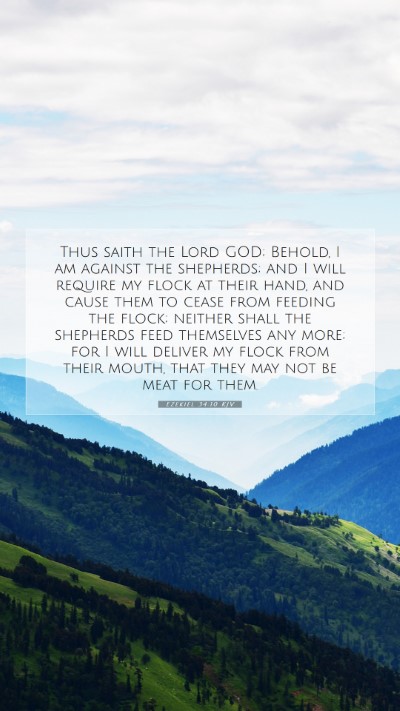Ezekiel 34:10 - Bible Verse Meaning and Commentary
Bible Verse: Ezekiel 34:10
"Thus saith the Lord GOD; Behold, I am against the shepherds; and I will require my flock at their hand, and cause them to cease from feeding the flock; neither shall the shepherds feed themselves anymore; for I will deliver my flock from their mouth, that they may not be meat for them."
Understanding the Verse
This verse is part of a larger passage where God expresses His discontent with the leaders of Israel, often referred to as "shepherds." The shepherds are responsible for the care of God's people, but they have failed in their duties, leading to the suffering of the flock.
Key Insights from Public Domain Commentaries
- Matthew Henry: Henry emphasizes the accountability of leaders. He notes that God will hold them responsible for their neglect and exploitation of the people. The "shepherds" symbolize bad leaders, and God's judgment upon them signals a restoration of His flock.
- Albert Barnes: Barnes highlights God's direct intervention. He states that God will remove wicked leaders, ensuring that they will no longer profit from the people or harm them. This verse serves as a warning about the consequences of failing to shepherd God's flock faithfully.
- Adam Clarke: Clarke discusses the implications of God's judgment and the promise of deliverance. He asserts that God’s provision for His people will be restored, and the true Shepherd, Jesus Christ, will ultimately guide them towards safety and nourishment.
Biblical Context and Themes
The context of Ezekiel 34 revolves around themes of leadership and divine judgment. Ezekiel uses the metaphor of a shepherd to critique leaders who have failed to protect and nurture their citizens. This reflects a broader theological theme in the Bible regarding God as the ultimate shepherd, contrasted with human leaders who often fail their responsibilities.
The Significance of Shepherd Imagery
In the biblical narrative, shepherding is a powerful metaphor for leadership. God, being the supreme Shepherd, contrasts with human shepherds who may exploit their power. This motif runs throughout both the Old and New Testaments, culminating in Jesus’ declaration in John 10:11, where He refers to Himself as the Good Shepherd.
Application to Daily Life
This verse encourages believers to reflect on the nature of leadership in their own lives. Whether in spiritual contexts, community roles, or family dynamics, it serves as a reminder of the weighty responsibility carried by those in positions of authority. Followers of Christ are urged to seek leaders who genuinely care for their well-being and to emulate Christ's servant leadership.
How to Interpret Bible Verses
To understand this and other Bible verses, consider the following: historical context, literary style, and theological implications. Engaging with commentaries, such as those of Henry, Barnes, and Clarke, can enhance your Bible study insights and allow for a deeper grasp of Scripture analysis.
Cross References
- Ezekiel 34:1-4 - A broader critique of the shepherds of Israel.
- Jeremiah 23:1-4 - Similar condemnation of unfaithful leaders.
- John 10:11-15 - Christ as the Good Shepherd.
- Psalms 23:1 - The LORD as our Shepherd.
- 1 Peter 5:2-4 - Instruction for elders to shepherd the flock willingly.
Conclusion
In conclusion, Ezekiel 34:10 serves as a stark reminder of the accountabilities associated with leadership. By understanding Bible verse meanings through the lens of faithful commentaries, we gain insights that not only inform our theology but also guide our daily lives and community interactions.
Engaging with the meaning of Bible verses like Ezekiel 34:10 allows us to participate in a greater dialogue about faith, leadership, and the care and compassion that should characterize those appointed to guide others. As we undertake our Bible study lessons, let this verse resonate in our hearts and minds, urging us to embody the values of true shepherding prescribed by God.


